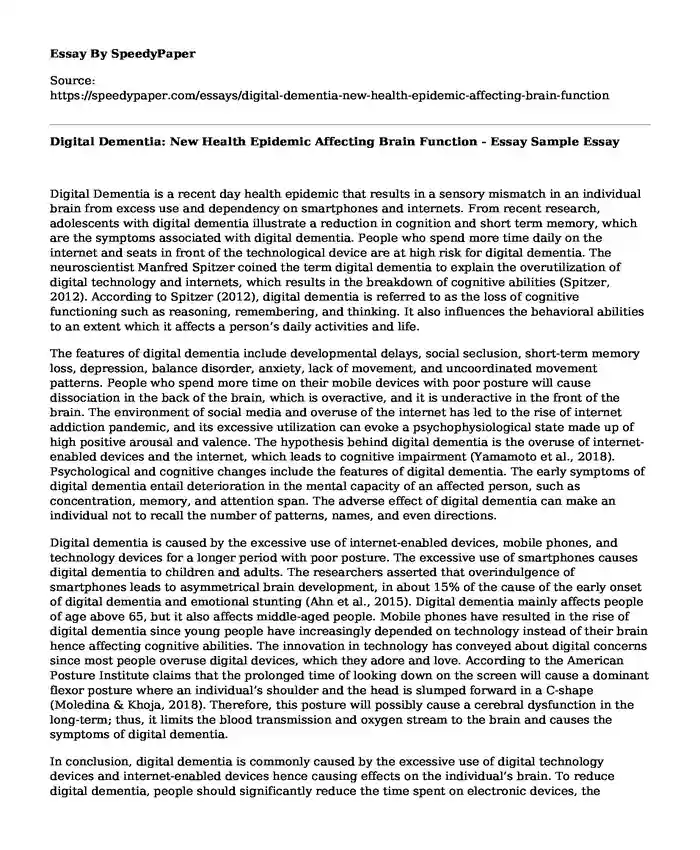
| Type of paper: | Essay |
| Categories: | Technology Mental disorder Disorder Dementia |
| Pages: | 3 |
| Wordcount: | 677 words |
Digital Dementia is a recent day health epidemic that results in a sensory mismatch in an individual brain from excess use and dependency on smartphones and internets. From recent research, adolescents with digital dementia illustrate a reduction in cognition and short term memory, which are the symptoms associated with digital dementia. People who spend more time daily on the internet and seats in front of the technological device are at high risk for digital dementia. The neuroscientist Manfred Spitzer coined the term digital dementia to explain the overutilization of digital technology and internets, which results in the breakdown of cognitive abilities (Spitzer, 2012). According to Spitzer (2012), digital dementia is referred to as the loss of cognitive functioning such as reasoning, remembering, and thinking. It also influences the behavioral abilities to an extent which it affects a person’s daily activities and life.
The features of digital dementia include developmental delays, social seclusion, short-term memory loss, depression, balance disorder, anxiety, lack of movement, and uncoordinated movement patterns. People who spend more time on their mobile devices with poor posture will cause dissociation in the back of the brain, which is overactive, and it is underactive in the front of the brain. The environment of social media and overuse of the internet has led to the rise of internet addiction pandemic, and its excessive utilization can evoke a psychophysiological state made up of high positive arousal and valence. The hypothesis behind digital dementia is the overuse of internet-enabled devices and the internet, which leads to cognitive impairment (Yamamoto et al., 2018). Psychological and cognitive changes include the features of digital dementia. The early symptoms of digital dementia entail deterioration in the mental capacity of an affected person, such as concentration, memory, and attention span. The adverse effect of digital dementia can make an individual not to recall the number of patterns, names, and even directions.
Digital dementia is caused by the excessive use of internet-enabled devices, mobile phones, and technology devices for a longer period with poor posture. The excessive use of smartphones causes digital dementia to children and adults. The researchers asserted that overindulgence of smartphones leads to asymmetrical brain development, in about 15% of the cause of the early onset of digital dementia and emotional stunting (Ahn et al., 2015). Digital dementia mainly affects people of age above 65, but it also affects middle-aged people. Mobile phones have resulted in the rise of digital dementia since young people have increasingly depended on technology instead of their brain hence affecting cognitive abilities. The innovation in technology has conveyed about digital concerns since most people overuse digital devices, which they adore and love. According to the American Posture Institute claims that the prolonged time of looking down on the screen will cause a dominant flexor posture where an individual’s shoulder and the head is slumped forward in a C-shape (Moledina & Khoja, 2018). Therefore, this posture will possibly cause a cerebral dysfunction in the long-term; thus, it limits the blood transmission and oxygen stream to the brain and causes the symptoms of digital dementia.
In conclusion, digital dementia is commonly caused by the excessive use of digital technology devices and internet-enabled devices hence causing effects on the individual’s brain. To reduce digital dementia, people should significantly reduce the time spent on electronic devices, the internet, and digital technologies. This will greatly mitigate the chances of falling victim to digital dementia. Also, young children should not be introduced at an early stage to technology devices, and postural disorders should be identified and corrected at an early stage.
References
Ahn, J. S., Jun, H. J., & Kim, T. S. (2015). Factors affecting smartphone dependency and digital dementia. Journal of information technology applications & management, 22(3), 35-54.
Moledina, S., & Khoja, A. (2018). Letter to the Editor: Digital Dementia–Is Smart Technology Making Us Dumb?. The Ochsner Journal, 18(1), 12.
Spitzer, M. (2012). Digital dementia: What our children and we are doing to our minds. Droemer: Munich, Germany.
Yamamoto, H., Ito, K., Honda, C., & Aramaki, E. (2018). Does Digital Dementia Exist?. In the 2018 AAAI Spring Symposium Series.
Cite this page
Digital Dementia: New Health Epidemic Affecting Brain Function - Essay Sample. (2023, Oct 15). Retrieved from https://speedypaper.net/essays/digital-dementia-new-health-epidemic-affecting-brain-function
Request Removal
If you are the original author of this essay and no longer wish to have it published on the SpeedyPaper website, please click below to request its removal:
- Essay Sample on Effects of the Internet on the Family
- Are Children Smarter Because of the Internet? Free Essay with the Answer
- Free Essay: How a Programmer Would Prove He or She Can Write Code
- Database and Network Security, Computer Science Essay Example
- Article Analysis Essay on Accommodating Students with Learning Disabilities and/or ADHD in the Classroom
- Yahoo Data Breaches: Causes, Challenges, and Impacts of Cyber-Attacks - Paper Example
- The Significance of Transcultural Nursing - Essay Sample
Popular categories




